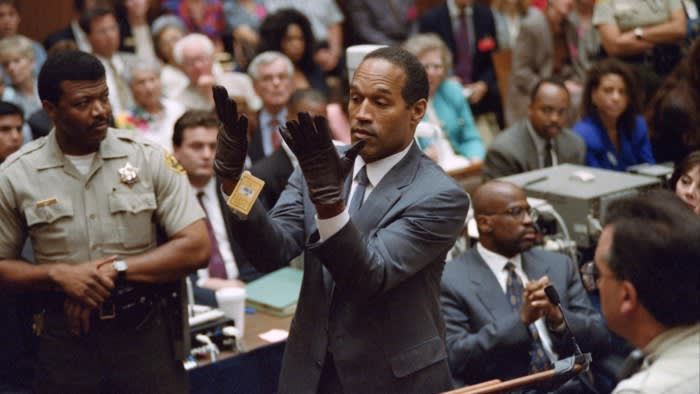OJ Simpson, NFL star known for ‘trial of the century’, dies aged 76

Gain access to the Editor’s Digest at no cost.
Every week, Roula Khalaf, who is the editor of the FT, picks out the most preferred stories for this newsletter.

OJ Simpson was an acclaimed American football player and movie star. He was found not guilty in a highly controversial murder trial in 1995, causing widespread discussion about issues of race and fairness in the American judicial system. Sadly, Simpson has passed away at the age of 76 after battling cancer.
Orenthal James Simpson was known for his impressive skills on the football field, as well as his attractive appearance and charming personality, which helped him excel as a spokesperson for Hertz rental cars and an actor in popular movies like The Towering Inferno and The Naked Gun. However, his most significant impact on American culture came during his 1995 trial for the alleged murder of his ex-wife, Nicole Brown Simpson, and her friend Ronald Goldman. This trial left a lasting impression on society and continues to be discussed and analyzed to this day.
The Simpson saga was designed for TV right from the start. The extensive reporting began with an odd, leisurely car chase on the streets of Los Angeles on June 17, 1994. Almost 100 million people in America tuned in to witness the Los Angeles police in pursuit of Simpson's white Ford Bronco, which was being operated by his pal and former NFL player, Al Cowlings.
In the subsequent year, individuals were fixated on their televisions for the significant trial. The trial involved one of the renowned Black residents in America being prosecuted in a courtroom located in Los Angeles. This occurred four years after the savage assault of a Black man known as Rodney King by the city's police, and the city was still affected by racial tension.
During the televised trial, Cochran and Shapiro, who were representing Simpson, used the topic of race and the LA police department to their advantage. They alleged that the evidence shown by the prosecutors was fake and had been planted by discriminatory and corrupt police officers.
The legal team working for Simpson made an accusation that a significant item of evidence put forward by the prosecution during the trial - a glove that was discovered outside Simpson's Brentwood residence that matched another one found at the location where the crime was committed - was intentionally placed by a police officer who held discriminatory beliefs.
When the prosecutors asked Simpson to wear the gloves, it seemed like he had difficulty fitting them on and said that they were "too tight". This created a very intense moment in the courtroom and it became the most iconic line from the case. During his final argument, Cochran informed the jury that they had to acquit if the gloves did not fit.
Simpson underwent a trial that lasted 10 months and was decided by a jury mainly composed of Black people. The jury found him innocent of the murder charges, and the verdict was announced after only four hours of discussion.
Surveys conducted across the country had revealed that there was a significant disparity in opinions between different racial groups when it comes to whether or not Simpson was guilty. This disparity was reflected in the reactions to the court's ruling. The trial had been a hot topic among the public for a long time, and the jury's verdict sparked intense discussions both on television and in workplaces all over America. The events that took place during the trial were subsequently portrayed in a 2016 televised drama called The People v OJ Simpson: American Crime Story.
In a civil trial held separately, a predominantly Caucasian jury deemed him responsible for the deaths during 1997, and he was compelled to award $33.5 million in monetary compensation to the bereaved families of both Brown and Goldman. As a result, Simpson opted to sell his luxurious Brentwood residence and relocate to Florida, generally perceived as a ploy to evade payment of the settlement.
Simpson had to deal with the consequences of the verdict for a long time, as Goldman's relatives kept pushing him to settle the lawsuit.
Back in 2006, Simpson penned a make-believe autobiography where he gave a theoretical narrative of how he carried out the murders. His book was supposed to be called If I Did It. However, Goldman's relatives took over the writing and renamed it If I Did It: Confessions of the Killer.
In just under 60 days, Simpson and a group of five former inmates went up against two traders in a Las Vegas hotel room, after losing power over a book. Shortly thereafter, he was taken into custody and faced accusations of armed robbery and abduction. Following a trial, he was found guilty and ended up serving a 9-year sentence in a Nevada correctional facility.
When Simpson was a young football player at the University of Southern California, no one could have thought that he would be involved in various controversies, trials, and even end up in prison. He was known for his impressive speed and charming smile on the field, and played American football for 11 seasons. He was a record-setter and was admired by his supporters who referred to him as "The Juice".
Numerous supporters backed him up after the killings, as per the blog section. He conveyed to The New York Times in 1995 that he did not believe the majority of people in the United States thought he was guilty, saying, "Several people have shown their encouragement through letters and telegrams, which count to thousands."



















































